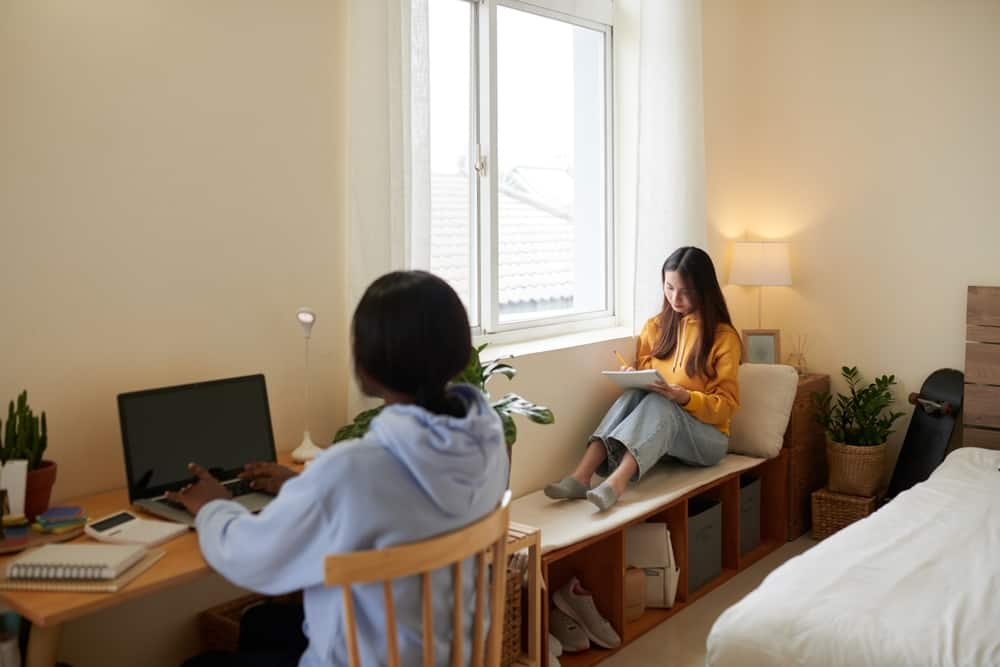Accommodation While Studying Abroad: Options Available, How To Choose, And More
A critical aspect of holistic undergraduate education abroad is residency. Where a student resides, especially at the undergraduate level, is highly deterministic of how rewarding and positive their study abroad experience turns out to be.

Choosing Accommodation Mindfully: Why?
Students who go overseas for higher education should always be mindful about the accommodation they choose for themselves. Here’s why:-
- Most students studying abroad stay away from their homes and families for the first time in their lives, which makes choosing conducive, healthy, and safe living environments all the more critical.
- Accommodation options, to a great extent, also determine the extent to which students face various challenges including homesickness, financial strains, cultural shocks, and beyond.
- They also provide (or fail to provide) support systems to students including informal peer groups, mentors, gradual cultural assimilation chances, and even counselling.
In this light, it becomes important to evaluate the different accommodation options available for students whilst they are studying abroad. Accommodation options abroad can be divided into two broad buckets: accommodation provided by the university and that sourced by students independently.
Also Read | Things To Know Before Choosing The UK As A Study Destination
 Students Who Decide To Study Abroad Should Be Mindful Of The Accommodation They Choose For Themselves
Students Who Decide To Study Abroad Should Be Mindful Of The Accommodation They Choose For Themselves
Accommodation Provided By University
A vast majority of universities abroad have campuses that sprawl over hundreds of acres and include various study halls, academic buildings, libraries, sports and cultural centres, and student dorms and hostels. Universities located in urban areas are perhaps an exception to this norm.
Indian students studying abroad at the undergraduate level tend to show a preference for accommodation provided by universities, especially in their first year. Whilst these tend to be more expensive, they offer unique benefits to students, including close proximity to the university's academic and cultural environments, and more opportunities to interact with students from across the world- all of whom are on their own journeys of settling into a relatively alien environment.
Students Dorms And Hostels
There are various options that can be explored for those who seek to reside within university campuses in accommodations provided by universities:-
Room Sharing | Hostels offer single, double, triple, and even quadruple-sharing rooms to students at differing price points. These options provide students with seemingly unlimited options to socialise, grow, and most importantly discover opportunities and circles that might play a significant role in determining students’ career options and life journeys in general. These are optimum solutions for first-year students because it allows them to gradually adjust to their university environments and life as an adult.
Costs | Costs are inclusive of heating, electricity, and wifi – which implies that there are fewer things to worry about in the lives of students in general. However, students are expected to manage other necessities including laundry and even food (at some residencies) by themselves.
Autonomy | Whilst these accommodation options are comparable to hostels in Indian universities, students typically enjoy a far higher level of autonomy and lesser restrictions. These dorms may be gendered or gender-neutral, depending on the host university and country.
Some Pitfalls | Whilst there is a certain degree of handholding that students living in dorms enjoy, this comes at the cost of flexibility. In many cases, students are mandated to stay in designated rooms and do not get to choose their own roommates. Incompatibility in this regard can be fairly detrimental to students’ undergraduate study-abroad experiences. Washrooms and other amenities are also shared by residents, apart from options that are fairly expensive.
 Universities Provide Various Kinds Of Accommodation If You Seek To Reside Within The Campus
Universities Provide Various Kinds Of Accommodation If You Seek To Reside Within The Campus
Independent Accommodation Options
Students may choose accommodation options that are not owned and managed by universities. There are different options that they may explore.
Private Hostels
These operate similarly to paying guests (PG) systems in India, with fairly higher levels of flexibility and lower levels of restrictions on students’ lifestyles.
- Simply speaking, these private hostels operate very similarly to university residencies.
- They are also strategically located close to university campuses, which reduces students’ travel times and expenses.
- Private hostels are slightly more flexible than university accommodation options, with students having the freedom to choose their own roommates, provided financial obligations are fulfilled.
- Private hostels may also provide contextual solutions to students coming from the same home country, which enables a more seamless adjustment to education abroad.
There are various private hostel options available to students depending on which country they reside in. Foreign education counsellors and visa agents have ready tie-ups with such private hostels which make them fairly approachable to Indian students.
Also Read | Winter And Spring Intakes For UG Admissions: US, UK, Canada, And Australia
Homestays
Perhaps the least explored yet one of the most interesting options is staying with a host family in a foreign country.
- Students stay as guests of a host family and enjoy several benefits pertaining to living in a domestic environment, the foremost of which is living with a host family that enables a seamless transition into a new culture and country.
- Homestay hosts are thoroughly vetted by universities to ensure that a conducive environment is provided to international students, which reduces the propensity of matching with dysfunctional households.
- However, homestays reduce the propensity of engagement with the student body and place students away from the buzz of a hostel campus or a student-dominated accommodation option.
- Moreover, homestays come with the highest number of regulations and rules that might not suit students with certain personality types and lifestyle choices.
Staying With Relatives/Family
This is perhaps the option available to the least number of students studying abroad but continues to offer unique benefits to students. Students can access a familiar homely environment and are protected from several shocks and challenges that one typically faces whilst studying abroad. Living at home whilst at university might possess certain limitations in terms of growth, exposure, and opportunities, but is still the best option for students with certain personalities or financial restrictions.
 Students Can Choose Accommodation That Are Not Owned And Managed By Universities
Students Can Choose Accommodation That Are Not Owned And Managed By Universities
Renting Apartments
Students can choose to rent flats either independently or with other individuals (not necessarily other students).
- This offers students the highest levels of autonomy and independence in terms of their lifestyles.
- However, it comes at the cost of higher responsibilities which includes managing each aspect of living alone independently. This option is hence most suitable to mature students, or those having some experience of living completely or partially independently.
- Whilst students do face the additional burden of travelling to the university campus regularly, they benefit from staying in more commercial localities which offer limitless internship and external growth opportunities to students.
- Moreover, one has the option to choose their flatmates and decide on an optimum residence based on several factors including but not limited to the financial cost, location, amenities, and personal space.
- Renting apartments often turns out to be cheaper than private and university-managed hostels, and often students have the benefit of having their own room.
Most apartments rented by students tend to be in close proximity to universities or have direct transportation linkages with them.
Factors To Keep In Mind
Students must keep the following factors in mind while choosing an accommodation option.
Location Of University | University-owned hostels tend to be better options to stay in if the university is located in an isolated/rural area. Urban centres offer safer and more diverse options to students.
Financial Constraints | Financial constraints play a role in almost all decisions surrounding studying abroad – including accommodation options. Students should choose options that are financially sustainable in the long run and also meet their immediate needs.
Comfort With Responsibility | University and private hostels, or even accommodation with family members (if that option exists) tend to be better for students who may not be comfortable taking complete responsibility for managing a house, and have rarely lived away from their families. However, students who have lived alone before, or tend to be more mature grow better whilst residing independently in apartments.
No One Size Fits All
A one-size-fits-all approach does not work whilst choosing accommodation options for students (similar to how it does not work in choosing universities). Each student has their own needs, maturity level, strengths, and weaknesses all of which must be closely considered and contrasted with thorough research of options to choose the most suitable solution.
An element of growth also exists, which implies that different options might be most suitable for different stages of the undergraduate journey. For example, students often choose to stay in university residencies for the initial semesters as they find their footing and later move into apartments that offer a whole different range of benefits to them.
Vijeeth Srinivas is a development consultant with more than extensive experience in the foreign education industry. With the Centre for Career Development and Essai Education he has helped hundreds of students secure positions in leading universities abroad. He is keen to make novel developments in education and skill development more accessible to students from diverse socioeconomic backgrounds.
Applications for Admissions are open.
Apply for UG & PG programs from Victoria University, Delhi NCR Campus
Study in Ireland
ApplyWant to study in Ireland? Explore Universities & Courses
Study in Canada
ApplyExplore Universities, Courses & Subjects | Work while study
Study in UK
ApplyApply for upcoming intake & plan your journey
Study in USA
ApplyUniversities inviting applications | Get expert guidance
Study in Australia
ApplyShortlist best ranked universities & get expert guidance
